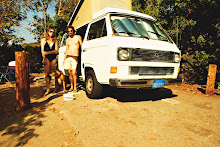
Overall, it felt refreshing to spend two days in nature. It was the first time I didn't spend an evening in front of the TV, and in my bed, apart from the hospital, for three months. We arrived at a San Clemente campsite at one o'clock Tuesday afternoon. The sun was shining. The first hour we spent readying the Vanagon, unloading the firewood. We listened to the new Fruit Bats album, and then to Bonnie Prince Billie, later Songs Ohia. The camper van stood out in a long line of large RV's, some equipped with satellite dishes. We took Artie for a hike. He walked the whole way carrying a stick in his mouth. When we arrived back at the site, I cracked a neer beer, Aimee poured some wine. We ate veggie dogs and chips and stared at the fire.
Occasionally I would look up at the moon and the stars. My gaze never lasted more than a four or five seconds. I lost some appreciation for the universe since the accident. The questions, the amazement is no longer there. I'm sad that it left and I hope it will return. I looked at the fire and talked to Aimee. Later we went inside the van, near the heater and played Trivial Pursuit. I was then dealt another blow, another realization that my intelligence has waned, when Aimee took a game. It was funny to see how happy the win made her. She kissed the gamebox. It was funny how disturbed I was from the defeat. I yelled and told her it was the injury. I finished my third neer beer, she her wine, and we went to sleep, the three of us on the Vanagon bed in front of a small space heater.
We woke up the next day to a cloudy, damp sky. We made breakfast on the stove and drank tea and coffee. Then my brother showed up with the surfboards in the back of the truck. Before I knew it, we were on the sand, looking at Trestles surf break. The sky was grey, the waves shoulder high during the larger sets. I was nervous. I had a hard time balancing as I put my wetsuit on. I saw bigger waves come through. My nerves were getting the best of me. I shuffled down to the water and felt the cold Pacific run in between my toes. The water was cold, my anxiety made it frigid.
I got on my board and paddled. It was a difficult paddle. I didn't have much strength. When I went under the waves, I couldn't hold my breath for more than a couple of seconds. After some effort, I was out in the lineup. It felt great but I was spent. I was more nervous than I thought I would be and a bit lightheaded. After ten minutes I caught a wave, went down the line, my balance seemed strong. And that was it. I called it a day. In retrospect, Trestles wasn't the best spot for a first surf after a brain injury. I was disappointed in my anxiety. Maybe I thought I would still have it. Maybe I thought that the injury wouldn't have an affect on everything I do. Maybe I was just unable to accept the facts. Maybe my abbreviated focus has prevented me from truly understanding my condition.
We walked back to the site, the rain now coming down. Aimee read as I wrote. The rain continued. We packed up camp and came home, one night early. Overall, apart from the surf session, it was a great trip. Seeing Aimee laugh and gloat over her win was enough. We needed that, I know she did.






